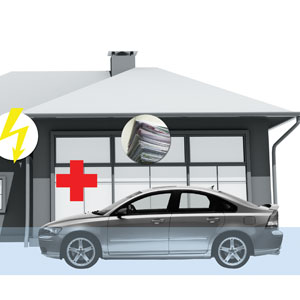The Philippine Atmospheric, Geophysical and Astronomical Services Administration (PAGASA) announced on the 1st week of June that the rainy season has officially begun. Although it’s a welcome respite from the tremendous heat we experienced last summer, the rainy season still strikes fear in the hearts of many, especially those who have experienced the wrath of typhoons Ondoy and Pepeng. Compounding our fear of this season is the health, security, and safety issues associated with it. Flashfloods, landslides, and the spread of infectious diseases often happen during the wet season and it is a must that we address them as they come, or better yet, prevent them from recurring. If your house got flooded before, you are more likely to experience it again should the same conditions arise. Given this, it is best to evacuate the house immediately if you think the occurrence of another flashflood is highly probable.
There are actually limitless ways to prepare for the rainy season. Although we can not tell exactly how and when disaster will strike, it is important that we have an alert mindset so that we may be able to react accordingly to any emergency situation. It is also ideal that everyone in the family is involved. A family that is trained and coordinated to react accordingly in emergency situations will likely have a greater chance of success than a family who is caught by surprise or overtaken by the events.
Tips
1. Ensure that gutters and drains are free of garbage, dirt, sticks, and leaves. This prevents it from clogging, thereby freeing you from the risk of collecting unwanted rain water within your premises.
2. Make provisions to prepare planks and sandbags. These can be useful in strengthening your doors and preventing floodwater from oozing in from any breaks or cracks in your doors and walls.
3. Invest in a sump pump if you have experienced having flooded basements after heavy rains.
4. Check electrical fittings and make sure that they are not affected by moisture to prevent electrical accidents.
5. Have a disaster kit ready. Typical items in the kit include: cash and credit card, food and water supplies, flashlight, lighters, extra batteries, chargers, extra clothing, blankets, first aid, baby supplies, portable transistor radio, etc..
6. A similar kit should also be available in your car together with tools.
7. Gather all important documents, such as birth & marriage certificates, insurance policies, car registrations, bank books, land titles, stocks, etc., and place them in a waterproof securable container. It is also good to have them scanned and backed up in CD or USB storage.
8. If you have a car, make sure it has ample gas just in case there is a need to evacuate or move to a higher ground.
9. Maintain a list of emergency numbers of Police, Fire, and other rescue units.
10. Make plans to arrange for an alternate place to stay such as a friend’s or relative’s house, or a hotel.






